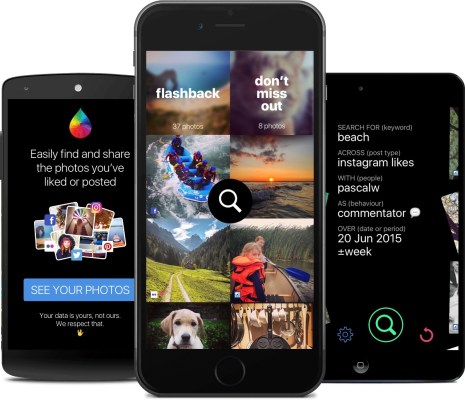Digi.me and Personal, two companies that broadly play in the personal data space by offering apps to securely store and share various data about yourself, are announcing a merger. Terms of deal remain undisclosed, although I’m told that the combined entity will operate under the Digi.me brand and give the company a 60-person headcount who will operate out of a global HQ near London in the U.K. and a U.S. operation based in Washington, DC.
Personal’s enterprise solution TeamData will be spun off as a separate information security and productivity solution for businesses, while the broader and hugely ambitious vision for the resulting Digi.me remains to become a major player in what founder and Chair Julian Ranger calls the emerging ‘personal data ecosystem’.
The premise, Ranger told me during a call late last week, is that consumers are being enticed to hand over more and more personal data in return for better products and services, but what is still needed is a platform to put you in control of how and who that data is shared with. This needs to be done in a transparent way, and the resulting platform on which companies can build apps on top of should adhere to the principal of informed consent.
Better still, what if your data doesn’t unnecessarily leave your own device or personal cloud storage but can still be shared with businesses on a per use case basis? Nearly 7 years in the making, this is the promise of Digi.me and now combined with Personal.
The way Digi.me works is that the mobile or desktop app asks where in your personal cloud you want your data stored — currently that means Dropbox, with the other usual suspects supported soon — and then it asks you to connect the app to various personal data-points. Right now this means social (e.g. Facebook, Twitter and Instagram etc.), with financial and health data currently in various testing phases, including a country-wide ‘living lab’ project with Iceland.
When needed, data stored in your personal cloud is securely processed via your own temporary virtual machine instance sitting on Microsoft’s Azure cloud so that it is normalised and kept up to date, with the local Digi.me app essentially acting as the front end, gatekeeper (including the holder of the needed keys), and distributor for that data.
Then when a third-party app needs access to a particular subset of your data, say your transactions for the last 24 months to do a more accurate credit score, it authenticates via the Digi.me app — meaning that you have to explicitly agree to the specific data request — and the Digi.me app pulls the data from your personal cloud and grants the third-party app access to it.
“Companies and developers can… use Digi.me’s APIs to request access to integrated data sets to provide better data-driven experiences, services, and rewards, and to provide other benefits like rich personal analytics. Health, wearable and music data will also be available soon after the merger,” explains the new joint company.
One crucial point here, however, and what makes the Digi.me proposition different from other approaches to personal data sharing is that the platform has been designed so that in many instances a third-party app can also process the data locally, meaning that it doesn’t need to leave your device. Instead, sticking to the example of a credit score checking app, it only transmits and stores the resulting credit score on its own servers, not the personal financial data it was based on.
That, says Ranger, changes the game completely and should in time mean consumers become comfortable sharing more data in return for new kinds of products and services. “Do more, privately,” is the company’s mantra.
“It isn’t about privacy or sharing, but both privacy and sharing when the point of integration and ownership is the individual,” he says, arguing that this opens up individuals to sharing data that they don’t today such as health, finance, and more.
Likewise, and where Digi.me sees a potentially very large business (since it charges on a per access basis, capped at $3 per user), is that the platform allows any company to have what he quite convincingly argues can be better data than Google et al because it can be wider and deeper and should remain a lot more accurate.
However, for this to become a reality, Ranger concedes it needs two things: Users to find enough utility in Digi.me to download the app and connect it to an increasing number of personal data points, and businesses wanting to develop on the platform, who, in turn, want access to enough users to make it worth their while. The classic platform chicken and egg, you might say.
To address this, Ranger says the app has been designed to be useful first and foremost on an individual and private basis as a way for you to search and get better insights into your own personal data, which benefits from being stored in a single place not multiple silos.
And for businesses who might not see Digi.me as delivering enough users yet — it counts around 400,000 — it has signed a number of partnerships to have those businesses also become a distribution channel for Digi.me. The logic being that a business could offer new functionality in its own app or service that requires a customer to start using Digi.me.
Meanwhile, today’s merger is all about Digi.me having a foothold in North America. As part of that it sees Shane Green, co-founder and CEO of Personal, become CEO of Digi.me’s U.S. operation.
Digi.me and Personal have raised over $40 million combined. Investors include Omidyar Network (the self-styled “philanthropic investment firm” co-founded by eBay founder Pierre Omidya), SwissRe, Planetary Holdings, TCS Capital Management, Allen & Company, Revolution Ventures, Ted Leonsis, and Esther Dyson.
